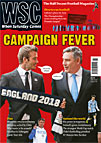 Adam Powley takes in the story of a footballer and soldier who broke race and class barriers but is yet to be officially recognised
Adam Powley takes in the story of a footballer and soldier who broke race and class barriers but is yet to be officially recognised
The experiences of one of British football’s black pioneers, and his courageous efforts to overcome adversity and break down barriers both in sport and the armed forces, has long merited an in-depth study. Now campaigners hope that a new book about Walter Tull will add impetus to the calls for him to receive the posthumous military honour his bravery deserved.
Author Phil Vasili first came across Tull’s name at a black history conference and began investigating his story in earnest in 1993. “The more I researched, the more captivating Tull became,” he says. “Plenty of publishers were interested in the idea for a book but none would commit. In the end I just wrote it, it was story that had to be told. His life had all the elements of drama and there was no need to embellish anything.”
The result is a meticulously researched portrait that reads like part detective work, part boy’s own adventure, albeit one that ends in heartbreaking tragedy. Born to a Barbadian father and English mother in Folkestone, Tull and his siblings were orphaned at an early age and he and his brother Edward were raised in a Bethnal Green children’s home. Imbued with a sense of “muscular Christianity” that stemmed from Methodist teachings, Walter became a fine footballer for Clapton before being snapped up by Spurs in 1909.
Two years later he moved to Northampton Town, where he made over 100 appearances and enjoyed his happiest time as a player. Prospects for a longer career in the game were good until war intervened. Tull joined up with the 17th Battalion of the Middlesex Regiment, later known as the Footballers’ Battalion, and saw active, not to say lethal, service on the Western and Italian fronts. His record was such that he was made a second lieutenant, and thus became the first black infantry officer in the British Army, confounding the colour bar that denied commissions to non-white servicemen.
Tull had confronted racism in his football career, suffering abuse at grounds such as Bristol City when playing for Tottenham, and he experienced head-on the institutionalised prejudice of the armed forces. Such was his popularity throughout his battalion, however, that when Tull was killed in the Second Battle of the Somme in 1918, the Leicester Fosse goalkeeper, Private Tom Billingham, risked his own life to vainly try to rescue the second lieutenant’s body. Tull’s superior officers informed Edward (and in doing so broke army regulations) that Walter had been recommended for the Military Cross for his action in Italy but to no avail –the MC was denied.
Over 90 years on, the wish to formally acknowledge Tull’s sacrifice persists. He never received his MC in the first place because the bar on black soldiers becoming officers meant the top brass did not recognise his action in the field – a Kafka-esque sleight of hand that modern campaigners are determined to negate. Vasili has been joined in such efforts by politicians, including Northampton MP Brian Binley. Binley, a descendent of Tull’s former Cobblers team-mate, Fanny Walden, has tabled an early day motion in parliament to support Tull’s cause, along with Keith Vaz MP.
Official resistance to bestowing Tull’s medal lingers on, however. The Ministry of Defence cites as justification that Tull cannot be a “special case”, with the inference that to award him the honour would invite a deluge of applications for other candidates. Vasili disputes this: “I understand what they are saying but I think their calculation is wrong. They made a distinct case for Walter in making him an officer despite the colour bar. They chose to look over precedent then because it was expedient – they needed to appoint working class officers, because so many who had been drawn from the upper and middle classes had been killed. Surely now, in terms of the scales of justice, they should allow Walter the award he was denied? He was unique then and is unique now. He has featured in exhibitions at the National Army Museum, so they recognise his heroism.”
For now there are hopes that the book may rekindle interest in a film project, while a stage play may also be in the offing. Whatever form such increased exposure takes, it will serve to make more people aware of Tull’s astonishing life, and perhaps help earn official recognition for a footballer who had an impact not just on his sport but society as a whole.
From WSC 279 May 2010